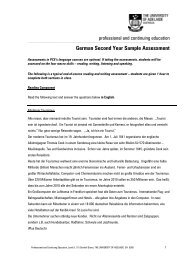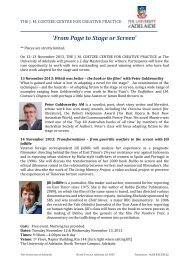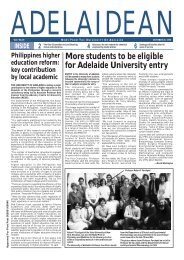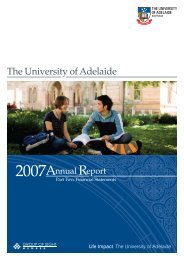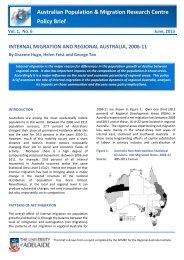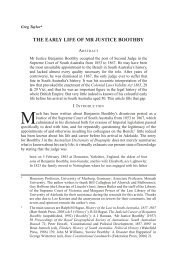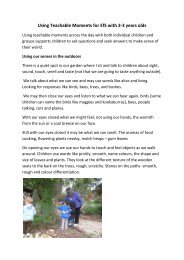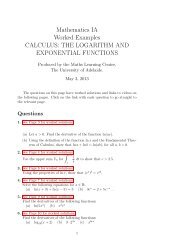Unbridling the Tongues of Women - The University of Adelaide
Unbridling the Tongues of Women - The University of Adelaide
Unbridling the Tongues of Women - The University of Adelaide
You also want an ePaper? Increase the reach of your titles
YUMPU automatically turns print PDFs into web optimized ePapers that Google loves.
<strong>The</strong> New Woman <strong>of</strong> South Australia: Grand Old Woman <strong>of</strong> Australia<br />
process <strong>of</strong> capital accumulation in <strong>the</strong> developing manufactures, which<br />
were inefficiently structured, subject to price and quality competition<br />
from overseas, relatively labour intensive, and, unlike o<strong>the</strong>r sectors, relied<br />
largely on domestic capital formation even prior to <strong>the</strong> cessation <strong>of</strong> British<br />
capital inflow in <strong>the</strong> 1890s. 22<br />
Markey was discussing changes in New South Wales and, secondarily, Victoria.<br />
Despite South Australia’s continuing reliance upon pastoralism and mining for local<br />
capitalist survival, similar developments in manufacturing also appeared <strong>the</strong>re,<br />
though on a very small scale, in <strong>the</strong> late 19 th century. Markey’s comments are as valid<br />
for South Australia as for New South Wales or Victoria.<br />
Spence had commented on a change from domestic to industrial production <strong>of</strong><br />
pickles and preserves for household consumption. <strong>The</strong> vines and fruit trees being<br />
grown on <strong>the</strong> outskirts <strong>of</strong> <strong>Adelaide</strong>, to <strong>the</strong> north in <strong>the</strong> Barossa Valley, and around<br />
Renmark near where <strong>the</strong> Murray crosses <strong>the</strong> South Australian border, were providing<br />
<strong>the</strong> means for development <strong>of</strong> a growing industry in preserving fruit. Like many<br />
o<strong>the</strong>r managers <strong>of</strong> households in <strong>Adelaide</strong> in <strong>the</strong> 1870s, she had probably found<br />
that jam could appear on <strong>the</strong> tea-table with far less effort and little more cost when<br />
bought ready-made from a local retailer than when made at home. 23 Workshops<br />
established in <strong>Adelaide</strong> to make biscuits and confectionery and to roll and pack tobacco<br />
undoubtedly had <strong>the</strong> same effect. 24 <strong>The</strong> jobs made available in such workshops<br />
must <strong>of</strong>ten have been casual seasonal work, but <strong>the</strong>y were jobs for <strong>the</strong> unskilled, and<br />
since women could be paid more cheaply than men, those jobs <strong>of</strong>fered to workingclass<br />
women some small alternative to domestic service which was still <strong>the</strong> principal<br />
opening for women needing to earn wages. A job in a jam factory was, unlike domestic<br />
service, beyond <strong>the</strong> confines <strong>of</strong> <strong>the</strong> domestic sphere.<br />
In <strong>the</strong> provision <strong>of</strong> clothing, <strong>the</strong> change was both more marked and more complicated.<br />
Machinery was introduced into <strong>the</strong> clothing industry in South Australia in<br />
<strong>the</strong> 1870s and 1880s, encouraging, and encouraged by, a tariff which <strong>the</strong> local capitalist<br />
legislators imposed on imported garments in 1887. 25 Industrialisation led to<br />
increasing specialisation <strong>of</strong> tasks in clothing factories and workshops, toge<strong>the</strong>r with<br />
a breakdown in old apprenticeship systems and abandonment <strong>of</strong> <strong>the</strong> ‘one man one<br />
garment’ principle. Such de-skilling generated a demand for cheap female labour.<br />
<strong>The</strong> harsh conditions, long hours and monotonous repetitive work were still attractive<br />
when compared with <strong>the</strong> hours, <strong>the</strong> personal subservience and indignity com-<br />
145




